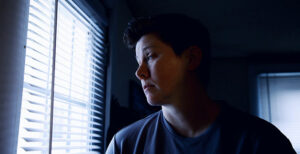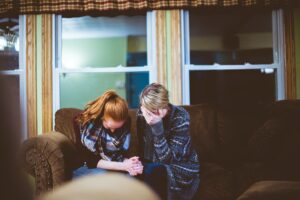“Denial is a protective device, a shock absorber for the soul. It prevents us from acknowledging reality until we feel prepared to cope with that particular reality.… We do not let go of our need to deny by beating ourselves into acceptance; we let go of our need to deny by allowing ourselves to become safe and strong enough to cope with the truth.” Melody Beattie, The Language of Letting Go
“Denial is a sacred place. Denial allows us to stay in control. It is a ledge we sit on above a cliff. Sometimes we need to stay there a little longer.” Chaplain Rev. John, quoted in “Finding Faith Through Listening,” by Andrea L. Merrill, MD, JAMA Online, July 13, 2023
Denial can cut off meaningful conversations
We were told to take off our hospice name tags before entering the home because the wife didn’t want her husband to know he was dying. On my one and only visit into the home, the man appeared yellow because of the progression of liver cancer. Even his eyes were yellow, and it turned out he was within days of dying.
 When I first walked into the home, I sat alone with the wife in the living room. She was very comfortable talking about her husband’s impending death. I asked her, “What is all this about not wearing our pins or talking about death? Does your husband know he is dying?” She said, “Oh, yes, he knows he is dying.” I asked, “How do you know he knows?” She responded, “Because he asked me.” I asked how she responded to him and she had told him, “Not while I’m around.”
When I first walked into the home, I sat alone with the wife in the living room. She was very comfortable talking about her husband’s impending death. I asked her, “What is all this about not wearing our pins or talking about death? Does your husband know he is dying?” She said, “Oh, yes, he knows he is dying.” I asked, “How do you know he knows?” She responded, “Because he asked me.” I asked how she responded to him and she had told him, “Not while I’m around.”
I suggested, “What if you had said, ‘Yes, you are dying and I’m going to miss you. We have had a wonderful marriage and I love you.’” She said, “I couldn’t do that. That would be too painful.”
Living in the shadow of a life-threatening illness is difficult. Worse yet, when it becomes clear that there is going to be no recovery, we naturally resist any thought of what really lies ahead. Understandably, this wife wanted to avoid such a painful discussion. That is why we have such a strong urge to deny the reality of the incurable nature of the disease. We want to avoid the emotional pain of saying good-bye. The man died while his wife was at the grocery store—remember she said, “Not while I’m around.”
Denial is normal

Photo by Ben White on Unsplash
Denying the reality of the terminal phase of a disease is normal, expected, and perhaps even necessary. It gets us through the initial shock of such a fate. Acknowledging the truth may cause anger and depression, which are, again, normal responses.
The father of a twenty-nine-year-old son who died of leukemia told me, “I lived in denial of the certainty of my son’s death to the very end. I was completely surprised when he died. I feel so guilty about that denial.” I thought guilt was a strange feeling for such a natural response as denial, so I asked him about that. He said, “I felt guilty because if I had accepted that he was dying, there were so many other things I would have said to him, but I lost that opportunity.”
[This blog post was adapted from my Light in the Shadows: Meditations While Living with a Life-Threating Illness.]
________________________
Chaplain Hank Dunn is the author of Hard Choices for Loving People: CPR, Feeding Tubes, Palliative Care, Comfort Measures and the Patient with a Serious Illness and Light in the Shadows. Together they have sold over 4 million copies. You can purchase his books at hankdunn.com or on Amazon.





